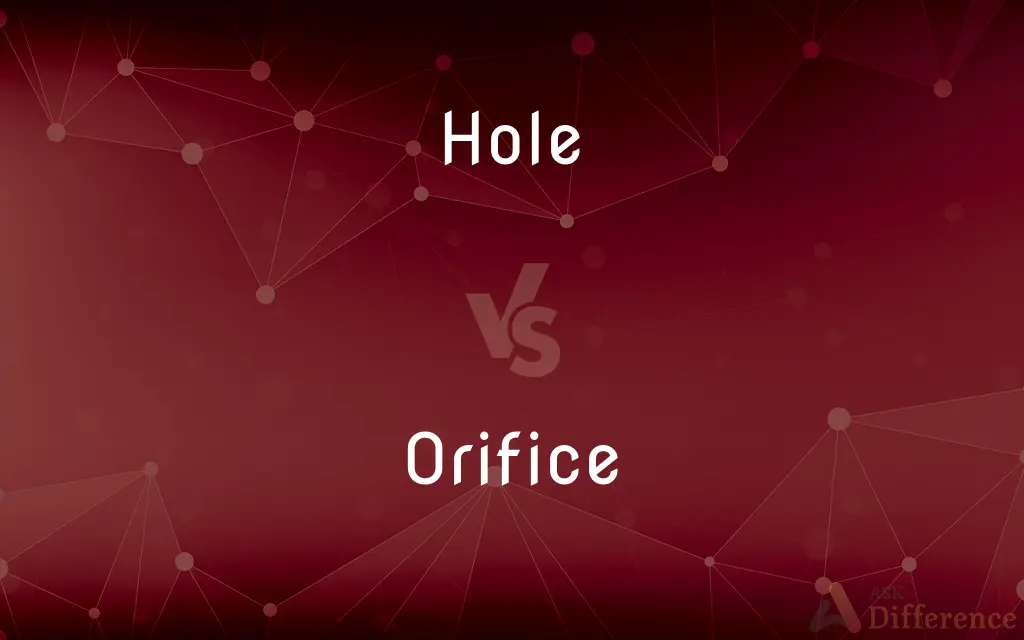Hole vs. Orifice — What's the Difference?
By Urooj Arif & Fiza Rafique — Updated on April 3, 2024
A hole is a broad term for any opening or cavity, while an orifice specifically refers to natural or designed openings on living beings or objects.

Difference Between Hole and Orifice
Table of Contents
ADVERTISEMENT
Key Differences
A hole represents an opening through a solid body or surface, which can be created naturally or through human intervention. These openings vary in size, shape, and purpose, such as for passage or storage. Whereas an orifice is a specialized term that usually denotes openings on living organisms or designed objects, often serving specific functions like entry or exit points for fluids, gases, or other substances.
Holes are commonly found in various contexts, from geology (caves, pits) to everyday objects (needle eyes, buttonholes). They are often the result of processes like drilling, cutting, or erosion. On the other hand, orifices are integral to biological and mechanical systems, such as nostrils for breathing or jet nozzles for controlling fluid flow.
The creation and purpose of holes are diverse, ranging from accidental breaches to deliberate spaces for fastening or decoration. Orifices, however, are typically natural or precisely engineered for specific roles, emphasizing their functional importance in biological and technological applications.
Maintenance and alteration considerations differ significantly; holes in materials like fabric or wood may require patching or enlargement based on need, while modifying an orifice, such as a valve or a bodily opening, often demands technical or medical expertise due to their specialized functions.
In terms of perception and application, holes can signify loss (as in material) or opportunity (as in golf), depending on context. Orifices, by contrast, are more closely associated with the functions of life or the operational aspects of machinery, underscoring their necessity for system integrity or biological survival.
ADVERTISEMENT
Comparison Chart
Definition
An opening through any surface or material.
A specialized opening on living beings or objects.
Creation
Can be natural or man-made.
Often natural or precisely engineered.
Function
Varies widely, from passage to storage.
Typically serves specific biological or mechanical functions.
Maintenance/Alteration
May require simple patching or modification.
Often requires expertise due to functional importance.
Associated Context
Found in various materials and contexts.
Primarily associated with biological and technological systems.
Compare with Definitions
Hole
A space left by the removal of material.
A hole in the ground where the tree used to be.
Orifice
A natural or designed opening on a body or object.
The orifice of the bottle was too narrow for the liquid to flow out smoothly.
Hole
An opening through a surface.
The mouse disappeared into a small hole in the wall.
Orifice
A precisely shaped opening for controlling flow.
The fuel injector has a tiny orifice to atomize fuel efficiently.
Hole
An aperture for inserting or passing objects.
She threaded the string through the hole of the bead.
Orifice
An aperture in medical terminology.
Various orifices of the human body are studied in anatomy.
Hole
A cavity or depression in a surface.
He dug a hole to plant the seed.
Orifice
An entrance or outlet in biological systems.
The mouth is an orifice used for intake of food.
Hole
A flaw or gap in a structure.
The plot of the movie had several holes.
Orifice
A technical term for openings in engineering.
The valve’s orifice regulates the flow of water.
Hole
A hollowed place in something solid; a cavity or pit
Dug a hole in the ground with a shovel.
Orifice
An opening, especially to a cavity or passage of the body; a mouth or vent.
Hole
An opening or perforation
A hole in the clouds.
Had a hole in the elbow of my sweater.
Orifice
A mouth or aperture, such as of a tube, pipe, etc.; an opening.
The orifice of an artery or vein; the orifice of a wound; the vagina and other orifices
Hole
(Sports) An opening in a defensive formation, such as the area of a baseball infield between two adjacent fielders.
Orifice
A stupid or objectionable person.
Hole
A fault or flaw
There are holes in your argument.
Orifice
A mouth or aperture, as of a tube, pipe, etc.; an opening; as, the orifice of an artery or vein; the orifice of a wound.
Etna was bored through the top with a monstrous orifice.
Hole
A deep place in a body of water.
Orifice
An aperture or hole opening into a bodily cavity;
The orifice into the aorta from the lower left chamber of the heart
Hole
An animal's hollowed-out habitation, such as a burrow.
Hole
An ugly, squalid, or depressing dwelling.
Hole
A deep or isolated place of confinement; a dungeon.
Hole
An awkward situation; a predicament.
Hole
The small pit lined with a cup into which a golf ball must be hit.
Hole
One of the divisions of a golf course, from tee to cup.
Hole
(Physics) A vacant position in an atom left by the absence of a valence electron, especially a position in a semiconductor that acts as a carrier of positive electric charge. Also called electron hole.
Hole
To put a hole in.
Hole
To put or propel into a hole.
Hole
To make a hole in something.
Hole
A hollow place or cavity; an excavation; a pit; a dent; a depression; a fissure.
I made a blind hole in the wall for a peg.
I dug a hole and planted a tree in it.
Hole
An opening that goes all the way through a solid body, a fabric, etc.; a perforation; a rent.
There’s a hole in my shoe.
Her stocking has a hole in it.
Hole
(heading) In games.
Hole
(golf) A subsurface standard-size hole, also called cup, hitting the ball into which is the object of play. Each hole, of which there are usually eighteen as the standard on a full course, is located on a prepared surface, called the green, of a particular type grass.
Hole
(golf) The part of a game in which a player attempts to hit the ball into one of the holes.
I played 18 holes yesterday.
The second hole today cost me three strokes over par.
Hole
(baseball) The rear portion of the defensive team between the shortstop and the third baseman.
The shortstop ranged deep into the hole to make the stop.
Hole
(chess) A square on the board, with some positional significance, that a player does not, and cannot in future, control with a friendly pawn.
Hole
(stud poker) A card (also called a hole card) dealt face down thus unknown to all but its holder; the status in which such a card is.
Hole
In the game of fives, part of the floor of the court between the step and the pepperbox.
Hole
An excavation pit or trench.
Hole
(figuratively) A weakness; a flaw or ambiguity.
I have found a hole in your argument.
Hole
(informal) A container or receptacle.
Car hole;
Brain hole
Hole
(physics) In semiconductors, a lack of an electron in an occupied band behaving like a positively charged particle.
Hole
(computing) A security vulnerability in software which can be taken advantage of by an exploit.
Hole
An orifice, in particular the anus. When used with shut it always refers to the mouth.
Just shut your hole!
Hole
Solitary confinement, a high-security prison cell often used as punishment.
Hole
(slang) An undesirable place to live or visit.
His apartment is a hole!
Hole
(figurative) Difficulty, in particular, debt.
If you find yourself in a hole, stop digging.
Hole
(graph theory) A chordless cycle in a graph.
Hole
A passing loop; a siding provided for trains traveling in opposite directions on a single-track line to pass each other.
We’re supposed to take the hole at Cronk and wait for the Limited to pass.
Hole
(transitive) To make holes in (an object or surface).
Shrapnel holed the ship's hull.
Hole
To destroy.
She completely holed the argument.
Hole
(intransitive) To go into a hole.
Hole
(transitive) To drive into a hole, as an animal, or a billiard ball or golf ball.
Woods holed a standard three foot putt
Hole
(transitive) To cut, dig, or bore a hole or holes in.
To hole a post for the insertion of rails or bars
Hole
Whole.
Hole
A hollow place or cavity; an excavation; a pit; an opening in or through a solid body, a fabric, etc.; a perforation; a rent; a fissure.
The holes where eyes should be.
The blind wallsWere full of chinks and holes.
The priest took a chest, and bored a hole in the lid.
Hole
An excavation in the ground, made by an animal to live in, or a natural cavity inhabited by an animal; hence, a low, narrow, or dark lodging or place; a mean habitation.
The foxes have holes, . . . but the Son of man hath not where to lay his head.
Hole
A small cavity used in some games, usually one into which a marble or ball is to be played or driven; hence, a score made by playing a marble or ball into such a hole, as in golf.
Hole
To cut, dig, or bore a hole or holes in; as, to hole a post for the insertion of rails or bars.
Hole
To drive into a hole, as an animal, or a billiard ball.
Hole
To go or get into a hole.
Hole
An opening into or through something
Hole
An opening deliberately made in or through something
Hole
One playing period (from tee to green) on a golf course;
He played 18 holes
Hole
An unoccupied space
Hole
A depression hollowed out of solid matter
Hole
A fault;
He shot holes in my argument
Hole
Informal terms for a difficult situation;
He got into a terrible fix
He made a muddle of his marriage
Hole
Informal terms for the mouth
Hole
Hit the ball into the hole
Hole
Make holes in
Common Curiosities
What defines a hole?
A hole is defined as an opening through a solid surface or material, which can be of any size or shape.
How are holes created?
Holes can be created naturally through processes like erosion, or through human actions like drilling or cutting.
What is the importance of orifices in biology?
Orifices are crucial in biology for the passage of substances, including air, food, and waste, facilitating essential life processes.
Are all orifices natural?
Not all; some orifices are engineered in mechanical and technological contexts for specific purposes, such as controlling fluid flow.
What is an orifice?
An orifice is a specialized opening, often natural or designed, on living beings or in mechanical objects, serving specific functions.
What is a common feature of holes?
A common feature is their variability in size, shape, and purpose, from functional to decorative.
Can a hole and an orifice be the same?
While they can overlap in concept, an orifice is more specific, often implying a function or natural occurrence, unlike the more general term "hole."
Can the creation of a hole be intentional?
Yes, holes are often intentionally created for various purposes, including passage, fastening, or as part of a design.
How can you alter a hole?
Holes can often be altered by expanding, filling, or modifying them, depending on the material and purpose.
Is modifying an orifice complicated?
Yes, modifying an orifice often requires expertise, especially if it serves a critical biological or mechanical function.
Why is maintenance important for holes and orifices?
Maintenance is crucial to ensure their functionality, prevent damage, and in some cases, preserve structural integrity or health.
Can the function of a hole change over time?
Yes, the function of a hole can change with alterations, usage, or due to the requirements of the surrounding structure or system.
What role do orifices play in mechanical systems?
In mechanical systems, orifices play a vital role in controlling the flow and pressure of gases and liquids, crucial for operational efficiency.
What distinguishes an orifice in engineering?
In engineering, an orifice is designed for precise control over the flow of substances, showcasing its functional specificity.
How does the function of an orifice relate to its design?
The function is closely related to its design, especially in biological and technological contexts, where each orifice serves a specific purpose.
Share Your Discovery

Previous Comparison
Enthalpy vs. Energy
Next Comparison
Fence vs. RailingAuthor Spotlight
Written by
Urooj ArifUrooj is a skilled content writer at Ask Difference, known for her exceptional ability to simplify complex topics into engaging and informative content. With a passion for research and a flair for clear, concise writing, she consistently delivers articles that resonate with our diverse audience.
Co-written by
Fiza RafiqueFiza Rafique is a skilled content writer at AskDifference.com, where she meticulously refines and enhances written pieces. Drawing from her vast editorial expertise, Fiza ensures clarity, accuracy, and precision in every article. Passionate about language, she continually seeks to elevate the quality of content for readers worldwide.














































